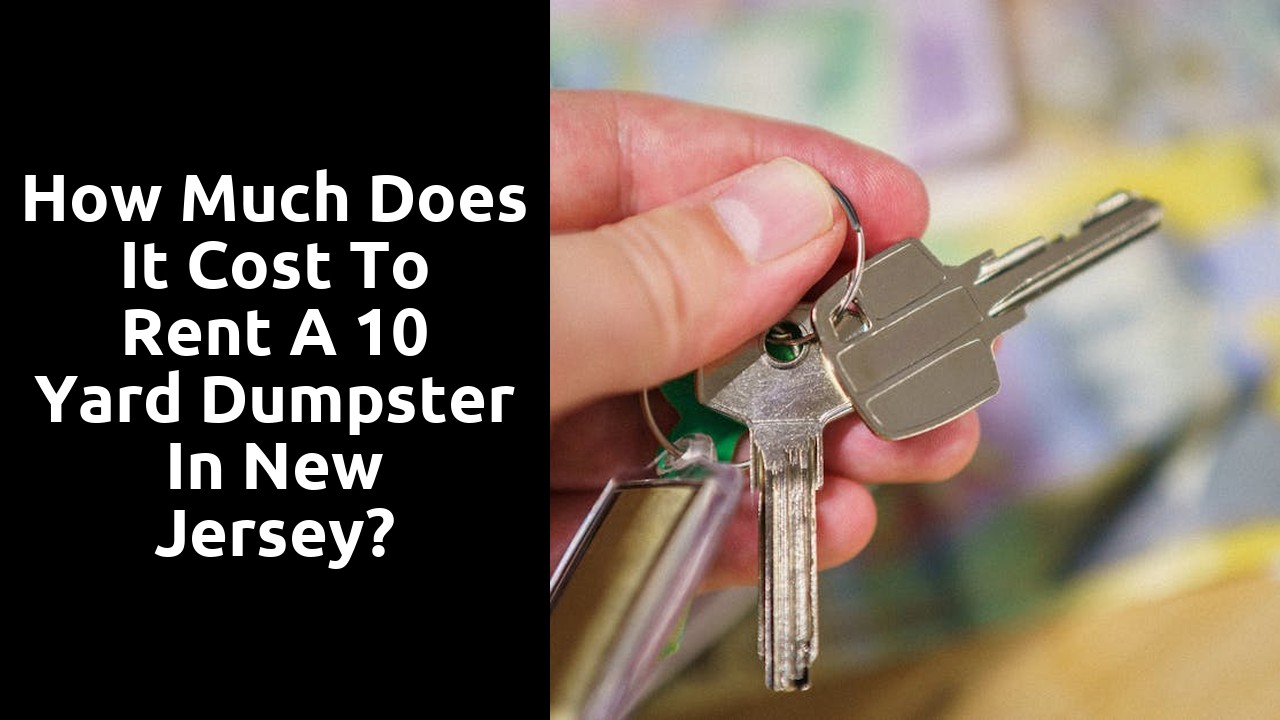How much does it cost to rent a 10 yard dumpster in New Jersey?

Table Of Contents
Materials Accepted in a 10 Yard Dumpster
A 10 yard dumpster is versatile and suitable for a variety of materials, making it ideal for small to medium-sized projects. Commonly accepted materials include household items, construction debris, yard waste, and general trash. However, specific guidelines may vary by rental company, so it is essential to confirm the acceptable materials before booking.
Certain hazardous materials are typically prohibited in standard dumpster rentals. Items such as batteries, chemicals, and electronics require special disposal methods due to environmental regulations. Understanding these restrictions can help avoid additional fees and ensure compliance with local waste management policies.
Regulations and Guidelines
Understanding local regulations is crucial when renting a dumpster. Each municipality in New Jersey may have specific rules governing where a dumpster can be placed, how long it can remain on a property, and what type of materials can be disposed of within it. Often, street placement may require a permit. Homeowners and contractors should familiarize themselves with these regulations to avoid fines and ensure a smooth rental experience.
Guidelines often include restrictions on hazardous materials and specific waste types like electronics or certain chemicals. Adhering to these rules not only facilitates proper waste management but also promotes environmental responsibility. It's advisable to consult with the dumpster rental company to clarify any uncertainties regarding regulations, as they can provide insights specific to different areas in New Jersey.
How to Choose the Right Size Dumpster
Selecting the correct dumpster size is crucial for the success of any project. A 10-yard dumpster typically holds around three pickup truck loads of debris, making it suitable for smaller renovations, garage cleanouts, or landscaping projects. Understanding the volume of waste generated by your project helps in making an informed decision regarding the dumpster size.
Assessing the type of materials you plan to dispose of can also guide your choice. Some projects may require more space due to bulky items or specific waste types, such as furniture or construction debris. It is advisable to think ahead about potential waste overflow, as a larger dumpster may prove more convenient than multiple trips to the landfill.
Assessing Your Project Needs
Understanding your specific project requirements is essential when determining the size of the dumpster you need. For small-scale projects, such as renovations or yard clean-ups, a 10-yard dumpster may suffice. If your project involves significant construction debris or substantial clean-outs, it may be necessary to consider a larger option. Evaluating the type and volume of materials you plan to dispose of will provide clarity on the capacity you require.
It is also important to think about the duration of your project. Short-term tasks may only require a rental for a few days, while longer projects might need several weeks. Consider how often you will be filling the dumpster and whether you may need additional pick-ups during the rental period. Properly assessing these factors ensures you choose a dumpster that meets both your size and time requirements effectively.
Tips for Saving on Dumpster Rentals
Renting a dumpster can add a significant expense to any project, but several strategies can help keep costs down. Comparing various rental companies is essential, as rates and services can fluctuate widely. Look for hidden fees that may not be included in the initial quote. Some companies may charge for weight overages or trip fees that can quickly accumulate. Understanding the fine print of each contract ensures that you stay within your budget.
Another effective way to save money is to plan your project to maximize the dumpster's capacity. Organizing materials and disposing of as much as possible before the rental can prevent underutilization of space. Consider sorting waste into categories for recycling, as many companies offer discounted rates for recyclable materials. This approach not only aids in saving money but also contributes to environmentally conscious waste management.
CostEffective Strategies
Planning your dumpster rental in advance can lead to significant savings. Research various companies to compare their pricing structures and service offerings. Some providers may charge extra fees for drop-off or pick-up, while others include these costs in their base rate. Knowing the exact locations of disposal sites and ensuring compliance with local regulations can also help avoid unexpected charges.
Consider consolidating your waste to maximize the 10-yard capacity. Carefully sorting materials before placing them in the dumpster can help you avoid overage fees. Additionally, renting during off-peak seasons might yield lower rates. Keeping your rental period as short as possible reduces the chances of incurring additional daily charges.
FAQS
What is the average cost to rent a 10 yard dumpster in New Jersey?
The average cost to rent a 10 yard dumpster in New Jersey typically ranges from $300 to $600, depending on factors such as location, rental duration, and the type of materials being disposed of.
Are there any additional fees associated with renting a 10 yard dumpster?
Yes, additional fees may include charges for exceeding weight limits, extra rental days, or specific disposal fees for hazardous materials. It's important to clarify all potential charges with the rental company beforehand.
How long can I keep a 10 yard dumpster?
Most rental companies allow you to keep a 10 yard dumpster for a standard rental period of 7 to 14 days. However, you can often request an extension for an additional fee.
What materials can I dispose of in a 10 yard dumpster?
A 10 yard dumpster generally accepts a variety of materials, including household junk, yard waste, and construction debris. However, hazardous materials like chemicals, paint, and batteries are typically prohibited.
How do I choose the right size dumpster for my project?
To choose the right size dumpster, assess the scope of your project, estimate the volume of waste you'll generate, and consider the types of materials you'll be disposing of. Consulting with a rental company can also provide valuable insight.